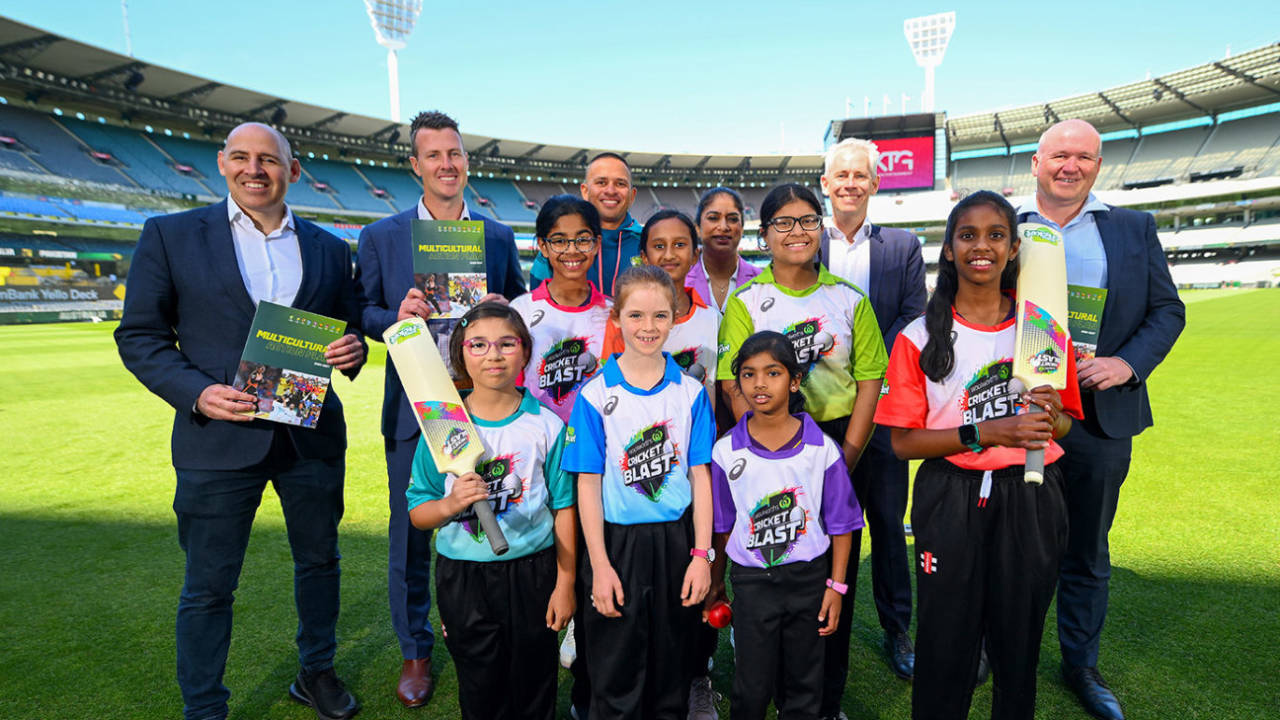Australia aim to double South Asian participation in cricket by 2027
The board launched a plan to boost participation and attendance among multicultural communities
Andrew McGlashan
22-Dec-2023
Usman Khawaja and Lisa Sthalekar were at the MCG to help launch the Multicultural Action Plan • Getty Images
Cricket Australia has set a target of nearly doubling the number of players from South Asian backgrounds in the professional game by 2027 as part of an overall plan to boost participation and attendance among multicultural communities.
The aim is to have 8% South Asian representation at first-class, state and W/BBL level by 2027, up from the current figure of 4.2%. They have also set the goals of doubling the number of people from South Asian backgrounds who attend matches in Australia each year from 100,000 to 200,000 and increasing the number of those registered to play from 70,000 to 100,000 by 2027.
Last year's men's T20 World Cup, which saw more than 90,000 attend the India vs Pakistan match at the MCG, highlighted the opportunity for Cricket Australia to grow the game.
However, one of the big challenges has been converting a large following into a pathway for player talent, as well as broader representation in the running of the sport.
Usman Khawaja, Alana King and Lisa Sthalekar have been key figures in putting the new Multicultural Action Plan together, which was launched at the MCG on Friday. While there has been specific focus on South Asian growth, the plan - and the funding that comes with it - covers all multicultural communities.
"I was out of the Australian team and thought what can I do about this, what legacy do I want to leave, what can I actually do to make this game to be in a batter place," Khawaja said. "The first thing I said is we have such great participation of South Asian communities and multicultural communities in Australia but we never see that reflected in the Australian cricket team, both male and female, especially the male team over the last 100 years.
"For me, personally, I felt we needed to do things a little differently. Cricket Australia has always been great supporters of multiculturalism in Australia... but it hasn't equated to more participation at the highest levels."
He drew on an example of when he was asked by someone how they could become a coach. "I said I wasn't exactly sure, because unless you were a past player or had been in the system before it's so hard to crack this system. The issue is that for a long time Cricket Australia has been a very white-dominated sport."
Khawaja, who was born in Pakistan before moving to Australia aged five, said that when he was growing up, he would struggle to relate to his team-mates and that coaches did not have an understanding of some of his experiences. But he stressed that sport had helped bring down barriers for him. He added that it was vital to have multicultural representation in all facets of the game including board level and CA staff.

Usman Khawaja spoke about how having broader representation can alleviate stereotypes•Getty Images
"We couldn't be stronger that we want to make every single cricket environment, whether that's clubs, playing, coaching, administering, just the most inclusive places we possibly can," CA chief executive Nick Hockley said. "The metrics [show] that we are not yet representative of the community we serve."
Khawaja further explained that having broader representation in the sport can help alleviate stereotypes, again talking from personal experience of when he was observing Ramadan during his time with New South Wales.
"I was told I was lazy growing up," he said. "There was a stereotype that subcontinent cricketers didn't try hard enough. There wasn't a way to break that down. All my coaches were white Australian, selectors were white Australian, they didn't really understand me or my culture.
"Doing Ramadan as a Muslim, at New South Wales no one had any idea what I was doing. From the naked eye, you think 'Uzzie isn't training hard enough, he's not working hard enough'. It's 6.30 in the arvo [afternoon] and I haven't eaten or drunk all day and I'm cooked. But we are doing a fitness session and I'm still out there. Yes, I'm lagging behind but I'm still doing the work. So it's those little things that you can break down if you have someone from subcontinental background."
Andrew McGlashan is a deputy editor at ESPNcricinfo
